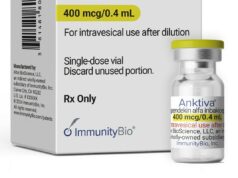
The Food and Drug Administration has approved a new drug in two formulations from Pfizer for cardiovascular complications from a disease that causes protein buildup in the body’s organs and tissues, setting it up as a potential competitor to Alnylam Pharmaceuticals.
New York-based Pfizer announced the FDA’s approval of Vyndaqel (tafamidis meglumine) and Vyndamax (tafamidis) for cardiomyopathy of hereditary or wild-type transthyretin-mediated amyloidosis, also known as ATTR-CM, meant to reduce cardiovascular mortality and hospitalization. ATTR causes abnormal amyloid proteins to build up in the body, and ATTR-CM occurs in about 100,000 people in the US each year. Vyndaqel comes in 20mg capsules – with four taken each day – while Vyndamax is a single 61mg capsule taken once a day.
The chief competitor on the market is Cambridge, Massachsetts-based Alnylam’s Onpattro (patisiran), approved for polyneuropathy of hereditary ATTR. Approved last August, Onpattro is the first drug to win an FDA nod for polyneuropathy caused by hATTR and the first drug in the class known as small interfering ribonucleic acid, or siRNA, treatments.
Shares of Pfizer were up less than 1 percent following the news, while Alnylam’s shares were down more than 4 percent.
In a note to clients, Cowen analyst Ritu Baral wrote that Vyndaqel/Vyndamax could become standard of care for ATTR-CM. On the other hand, its price of $225,000 – exceeding analysts and investors’ expectations – will severely limit its use and make combination treatment with Onpattro prohibitively expensive despite the two drugs’ complementary mechanisms of action. The high price tag will also likely limit its use among patients with mild cardiomyopathy, who would be most likely to benefit from it. Moreover, the high price tag will also likely mitigate its potential commercial threat to Onpattro and Alnylam’s TTR franchise.
Currently, the two drugs’ labels do not overlap, and Baral wrote there is little to no direct commercial threat posed by the Pfizer drug. Nevertheless, it does pose a threat to Alnylam’s TTR franchise. This includes Onpattro itself, which is in development for ATTR-CM, and vutriseran, though for compliance reasons the subcutaneously injected vutriseran could have an advantage over the orally administered Vyndaqel/Vyndamax. The FDA approval of Pfizer’s drug could also complicate enrollment in the clinical trials for the Alnylam drugs in ATTR-CM, Baral wrote.
Photo: Michael_Petrov-96, Getty Images








